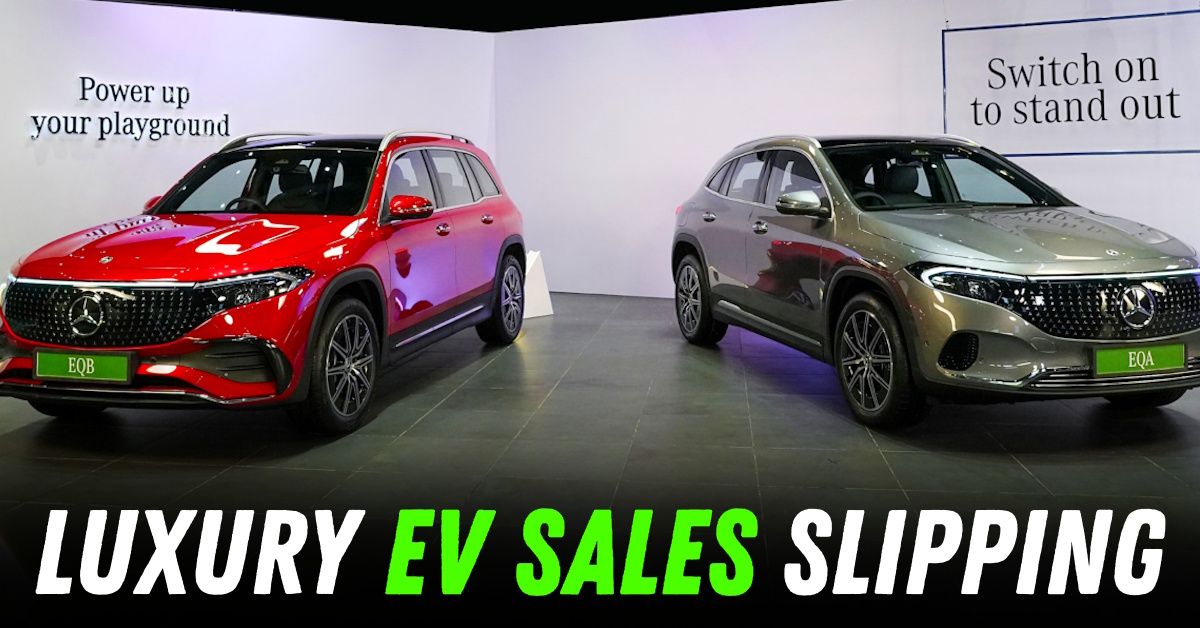Luxury EVs Hit A Wall: Mercedes, Volvo, Audi Sales Plunge Despite Mass Market Boom


The electric car revolution is gathering pace, with new records being set and more people than ever choosing battery-powered vehicles. But while the mass market is charging ahead, a very different story is unfolding at the top end.
Sales data from January to April 2025 shows that luxury electric vehicles-those from Mercedes, Volvo, and Audi-are struggling to keep up, with some brands seeing their sales plunge even as the broader EV market booms.
The numbers draw a clear contrast. In April 2025, total electric car sales reached a new high, with 12,330 units sold-a jump of 58 percent compared to the same month last year. This surge was fuelled by brands like MG, Mahindra, and Tata, whose affordable and mid-range EVs are finding plenty of buyers. New models, improved charging infrastructure, and a growing appetite for clean mobility are all contributing to this success.
But in the luxury segment, the situation is quite different. Sales of luxury EVs actually dropped by 2 percent in April, slipping from 257 units last year to 253 this year. This may seem like a small dip, but it stands in stark contrast to the explosive growth seen in the mass market.
The details are even more telling: Mercedes-Benz’s luxury EV sales fell by a massive 40 percent year-on-year, while Volvo’s dropped by 13 percent. Audi’s numbers shrank dramatically too, with just three luxury EVs sold in April-a 77 percent decline from last year.
So, what is holding back luxury electric cars, even as the rest of the market races ahead? There are a few clear reasons.
First, price is a major obstacle. Luxury EVs remain significantly more expensive than their petrol or diesel counterparts, and even more so compared to mass-market electric cars. Import duties, high-end features, and limited local manufacturing all add to the cost. For many, the appeal of a luxury badge is simply not enough to justify the steep price tag, especially when the technology is still evolving and resale values are uncertain.
Second, charging infrastructure is a big concern for luxury car owners. While the charging network is expanding, it is still patchy, especially outside major cities. Luxury EVs, with their larger batteries and higher power requirements, need fast and reliable charging options. The lack of a seamless, premium charging experience can be a deal-breaker for those used to the convenience and comfort that come with a high-end car.
Third, there is a mismatch between what luxury EVs offer and what buyers expect. Many luxury car owners are looking for long range, quick charging, and a driving experience that matches or exceeds their petrol or diesel cars. While the latest EVs are impressive, not all models deliver on these fronts-at least not yet. Some buyers are waiting for the next generation of technology before making the leap.
The luxury EV market is not without its bright spots. BMW, for example, bucked the trend in April, selling 128 electric cars-a 117 percent increase from last year. This gave BMW a 51 percent share of the luxury EV segment for the month, putting it well ahead of its rivals. But for others, the news is less positive. Mercedes-Benz, despite leading the luxury EV push in previous years, saw its sales drop to just 81 units in April. Volvo managed only 35, and Audi, as mentioned, just three.
Overall, the luxury EV segment remains a tiny fraction of the total market. In April, luxury EVs accounted for just over two percent of all electric car sales. Even within the premium segment, electric models make up a small share of overall sales, with most buyers still opting for petrol, diesel, or hybrid options.
The challenges facing luxury EVs are not unique. High prices, range anxiety, and limited charging infrastructure are issues for the entire electric car market. But in the luxury space, expectations are higher and the stakes are greater. Buyers are less willing to compromise, and any shortcomings are magnified.
There is also the question of local manufacturing. Most luxury EVs are still imported, which means higher prices and longer wait times. Until more brands start assembling or manufacturing their electric cars locally, it is unlikely that prices will come down enough to drive mass adoption at the top end.
Despite the current slowdown, luxury carmakers are still investing in new models and expanding their electric portfolios. However, the numbers speak for themselves. As mass-market EVs accelerate, luxury electric cars are hitting a wall-held back by high prices, infrastructure gaps, and a market that is not quite ready to go fully electric at the premium end. The next few years will reveal whether luxury EVs can overcome these roadblocks or remain a niche choice for a select few.